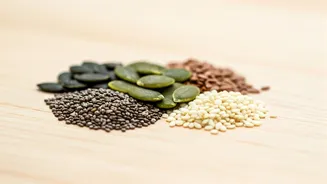Seeds & Heart Health
Seeds offer a remarkable pathway to improving heart health and lowering cholesterol, acting as potent allies in the quest for well-being. These tiny powerhouses
are rich in essential nutrients, like fiber, healthy fats, and antioxidants, all vital components in maintaining a healthy cardiovascular system. Fiber, particularly soluble fiber, works by binding to cholesterol in the digestive tract, preventing its absorption into the bloodstream. This process helps lower LDL (bad) cholesterol levels, which are a major risk factor for heart disease. The healthy fats found in seeds, such as omega-3 fatty acids, help reduce inflammation and improve overall heart function. Antioxidants combat oxidative stress, which can damage blood vessels and contribute to heart disease. Including these seeds in your diet not only provides key nutrients but also supports a holistic approach to maintaining a healthy heart.
Flax Seeds' Power
Flax seeds are exceptional in their ability to support heart health, mainly attributed to their high omega-3 fatty acid content, particularly alpha-linolenic acid (ALA). These fatty acids are essential for reducing inflammation throughout the body, benefiting the cardiovascular system significantly. Chronic inflammation contributes to the development of heart disease, and by lowering inflammation, flax seeds offer a protective effect. Additionally, flax seeds are a rich source of soluble fiber, which plays a critical role in lowering cholesterol levels. The fiber binds to cholesterol in the digestive tract, which prevents its absorption into the bloodstream, leading to decreased LDL (bad) cholesterol levels. This reduction in LDL cholesterol helps to reduce the risk of plaque buildup in the arteries. Regular consumption of flax seeds is therefore a practical step towards a healthier heart and the prevention of cardiovascular diseases.
Chia Seeds' Benefits
Chia seeds, tiny yet mighty, contribute significantly to heart health through their rich nutritional profile. They contain a substantial amount of soluble fiber, which effectively lowers cholesterol levels by trapping cholesterol in the digestive system and preventing its absorption. This action helps reduce the concentration of LDL cholesterol, the type that contributes to plaque buildup in arteries. Chia seeds are also packed with omega-3 fatty acids. These fatty acids are well-known for their anti-inflammatory effects. Chronic inflammation is a major risk factor for heart disease, and omega-3s assist in reducing this inflammation, promoting overall cardiovascular health. Furthermore, chia seeds are a great source of antioxidants, protecting the cardiovascular system from oxidative stress, another contributing factor to heart disease. The combination of these benefits makes chia seeds a valuable addition to a heart-healthy diet.
Hemp Seeds' Advantages
Hemp seeds stand out as a heart-healthy food due to their balanced ratio of omega-3 and omega-6 fatty acids, along with their high protein content. The optimal ratio of these fatty acids is crucial for reducing inflammation and supporting overall cardiovascular function. Hemp seeds provide a significant source of both these essential fatty acids, helping maintain this balance. Their protein content also plays a role in heart health; protein aids in repairing and maintaining body tissues, which includes the lining of blood vessels, contributing to overall cardiovascular well-being. Hemp seeds are also a source of amino acids, which are the building blocks of proteins and are essential for various bodily functions, including heart health. Regularly incorporating hemp seeds into your diet provides a comprehensive approach to supporting and improving cardiovascular health.
Pumpkin Seeds' Impact
Pumpkin seeds bring notable advantages to heart health, with their rich content of antioxidants and magnesium being key benefits. Antioxidants help fight oxidative stress, which can damage blood vessels and lead to heart disease. Pumpkin seeds are also an excellent source of magnesium, a mineral that aids in regulating blood pressure. High blood pressure is a significant risk factor for heart disease, and magnesium helps relax blood vessels, thus reducing blood pressure and improving heart function. Additionally, pumpkin seeds provide a good amount of fiber, contributing to lower cholesterol levels by binding to cholesterol in the digestive tract, therefore helping prevent its absorption. By combining antioxidants, magnesium, and fiber, pumpkin seeds offer a well-rounded contribution to maintaining a healthy heart and reducing the risk of cardiovascular diseases. Regular consumption can be a proactive step towards improved heart health.
Sunflower Seeds' Role
Sunflower seeds are highly beneficial for heart health, with their high vitamin E and selenium content. Vitamin E is a powerful antioxidant, protecting the body from oxidative damage, which is a major contributor to heart disease. Selenium also serves as an antioxidant, enhancing the protective effect against cellular damage in the cardiovascular system. These antioxidants combat free radicals that can damage blood vessels and promote inflammation. Sunflower seeds also offer essential fatty acids, which play a role in maintaining healthy cholesterol levels and reducing inflammation. Furthermore, they are a good source of fiber, contributing to lower cholesterol by binding to cholesterol in the digestive tract. By including sunflower seeds in your diet, you provide your body with important nutrients, aiding in the protection and maintenance of a healthy heart, along with the reduction of risk factors associated with heart disease.















